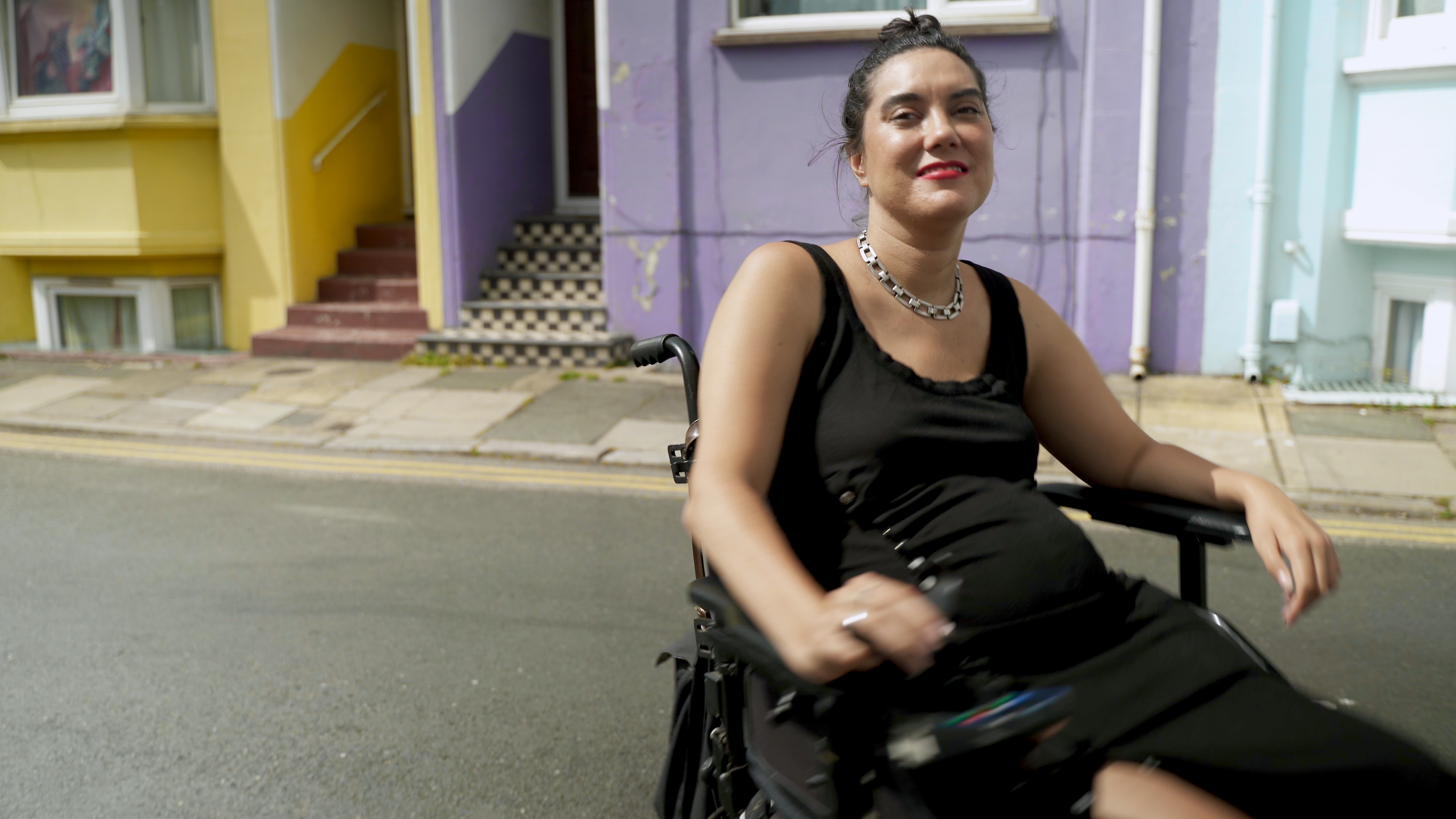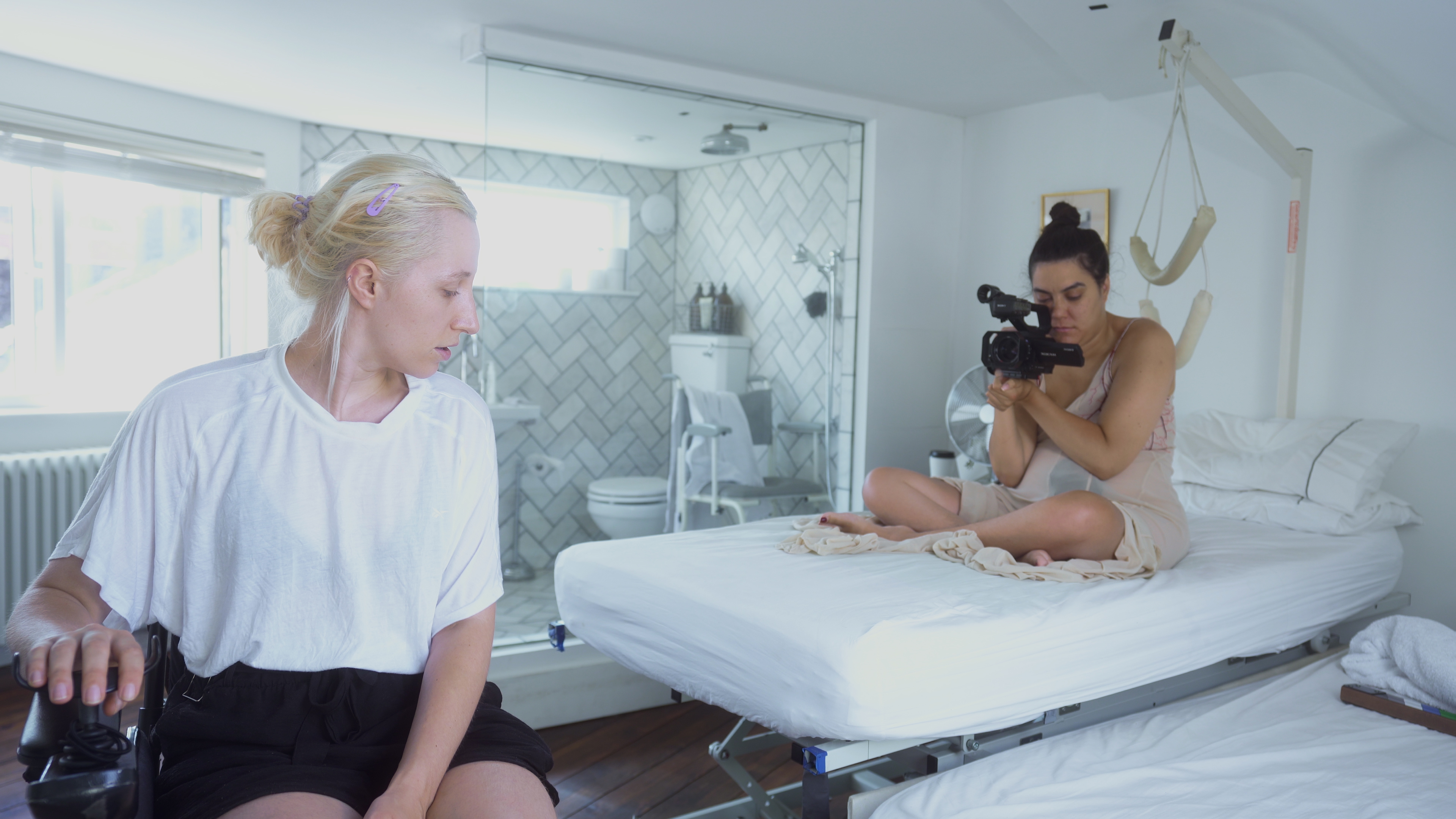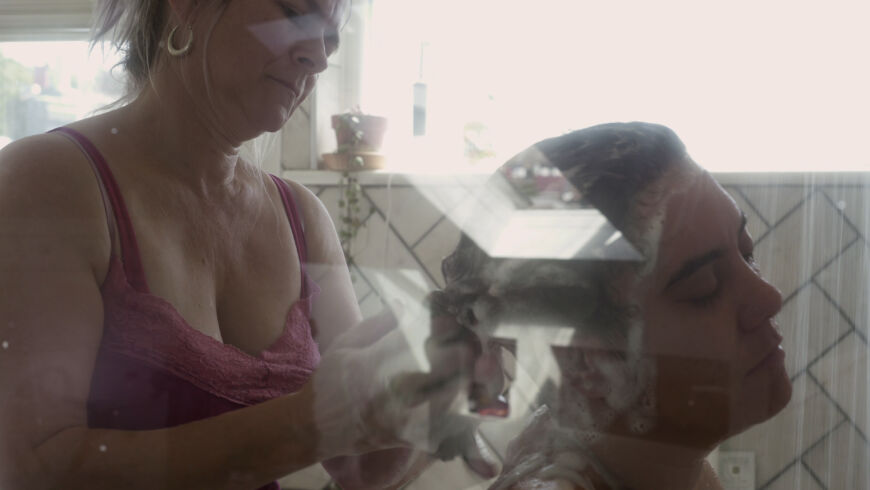The Fluidity of Care
Rebekah Taussig
Writer Rebekah Taussig explores how caregiving is both a personal and communal experience in this powerful response to Kyla Harris and Lou Macnamara's It's Personal.
Projects
My partner Micah and I were standing in line waiting to check him in for his appointment at the cancer centre. Micah was diagnosed with colon cancer seven days after we’d found out we were pregnant, and he’d started radiation and chemotherapy treatments as my belly grew. Sitting in my wheelchair in front of him, I felt Micah slip his hands behind my back to keep them warm – a familiar and unique form of intimacy we share. A coordinator with a tablet approached us, eager to gather patient information and keep the line moving. Before she spoke, Micah and I both knew what was about to happen. It had become routine. “Patient name?” she asked, looking down at me and smiling with professional anticipation. Because of course the disabled body must be the only one here for care.
I’ve been disabled since I was a toddler, and I’ve long felt my disabled body flatten into a symbol under the gaze of onlookers, diminishing into a lump of assumed dependence or fracturing into mythic heroism triumphing over the inherent sadness of her life. These one-dimensional narratives about bodies like mine have been told and retold so many times that I am a trope. Disabled characters are depicted as needing and taking; they are rarely the ones operating from a position of abundance with the ability to give anything more than a splash of inspiration. The stories that play out on screens are reenacted in real life. When a wheelchair shows up in a hospital waiting room or a mini-series, we often go on autopilot, assuming we already know.
As the music thrummed through the opening credits of It’s Personal, I got actual goosebumps across my forearms. The sight of a disabled woman spinning under the sun in her power chair, applying a perfect cat-eye liner in the mirror, giggling in front of the camera with blunt humour and bangs was so jarring to me that my body reacted before my brain. The camera panned over plants, a jar of paintbrushes, and a woman in her wheelchair on an elevator lift all to the tune of hip music, and my body knew: This is different.

To begin, Kyla wasn’t silhouetted sadly in her wheelchair, isolated in a hospital room, sterilised into a cliché. She wasn’t pushing herself over metaphoric mountains as the people cheered either, held above and apart from the rest of humanity. She was integrated into a messy, playful community of her own making. She was funny. And smart. And ordinary. And she had a specific problem to solve – she needed care during the global pandemic, and she’d decided to train her friend Lou to fulfill the role in a mere seven days.
My situation isn’t exactly the same as Kyla’s. I don’t hire personal care attendants at this point in my life, and the person who does a lot of the caregiving for me is not just my friend, but my life partner and co-parent. Even so, the puzzle Kyla and Lou are piecing together feels as familiar as a childhood lullaby. I watched the two friends chat while Kyla taught Lou how to stretch her disabled legs and immediately recognised the back and forth flow of caregiving – the humour; the intimacy. I can almost feel Micah lifting my leg against his chest until my hamstring feels tight as we catch up on the cringey and tiny victories of our days. As Kyla trains Lou how to operate Edna (her beloved power chair), I can picture the ease with which Micah flings my chair in and out of our car, and I’m flooded with familiar questions: what counts as ‘caregiving’, and how is that different than simply caring for the person you’re with? Am I caregiving when I get out the clippers and trim Micah’s scraggly hair?
As the two have a matter-of-fact conversation about the mechanics of catheterising Kyla, I immediately think about the great pains my adolescent self took to hide my own catheters, terrified someone would know I had to use this tiny plastic tool to pee. But Kyla slashes the taboo with a few swift moves, bringing us back to the personal, yet again. “I don’t know if I want to be friends with someone who’s not willing to help me pee,” she says to Lou. And I picture her words sprawled boldly across a big bumper sticker plastered to the back of my own chair. Because of course, as Kyla’s casual tone seems to insist, everybody pees! But Kyla’s confidence makes me wonder, how do I hold onto my dignity while asking for help? How do I bring another person in on the unique needs of my body? How do we keep the power in balance while I sit here with my legs spread apart?
Just like the rest of us, Kyla is affected by ableism, and she articulates the very anxieties that have gripped my life since I was little. “The more I ask for,” Kyla confesses her fears to Lou, “the less desirable it will be to be around me.” As a disabled woman, I’ve worried about being a burden since I was a child, quick to retreat as soon as I sense my presence becoming a drag on anyone else, but as I watch Kyla and Lou work out their rhythms of care, it strikes me that these are concerns for all of us living in a world that trains us in the tenets of ableism – namely, those without obvious needs are superior, asking for assistance is weakness, and independence is the unwavering goal. Kyla and Lou invite viewers – disabled and not – into a more complicated examination of the ‘economies of care’.

My connection to each scene and conversation throughout It’s Personal feels deeply personal to me, as if Kyla and I are the only ones who've ever had to grapple with having a need, but Kyla and Lou remind me this is a conversation for all of us. “People are just realising we’re interdependent,” Kyla says with calm and matter-of-fact confidence in an early conversation with Lou. “Independence is a myth.” We like to pretend we operate in independent bubbles and imagine this will continue for as long as we both shall live. We imagine people fit neatly in tiny, boxed roles – the caregiver and the care receiver – the patient and the support person. But, as It’s Personal depicts with humour, beauty, and grace – with hugs and tears and late-night hash browns – these lines are blurred. There’s something much meatier, richer, and more sustainable possible here.
Over the last year, my disabled body has cared for Micah’s cancerous one and birthed a whole human baby we both care for. All three of us are attached to each other and engaged in an incessant, busy, fluid dance of giving and taking in every possible direction. As we check in, ask, enjoy, and care for the others, we’re building a structure strong enough to hold and sustain us all. This is how we’re keeping afloat on the little island that is our family, but I have to wonder what would happen if these questions Kyla and Lou pose permeated out and into our public consciousness. How might they bolster us?
–––
Rebekah Taussig is a Kansas City writer and teacher with her doctorate in Creative Nonfiction and Disability Studies. She runs the Instagram platform @sitting_pretty, where she crafts “mini-memoirs” to contribute nuance to the collective narratives being told about disability. Released by HarperOne in August 2020, her memoir in essays, Sitting Pretty: The View from My Ordinary Resilient Disabled Body provides a nuanced portrait of a body that looks and moves differently than most. She lives in a tiny, old house with her fussy family of tenderhearted snugglers. You can follow her work and sign up for her newsletter at www.rebekahtaussig.com.
The Fluidity of Care by Rebekah Taussig is commissioned by Film and Video Umbrella as part of the release of It’s Personal by Kyla Harris and Lou Macnamara, commissioned by Film and Video Umbrella as part of BEYOND.

